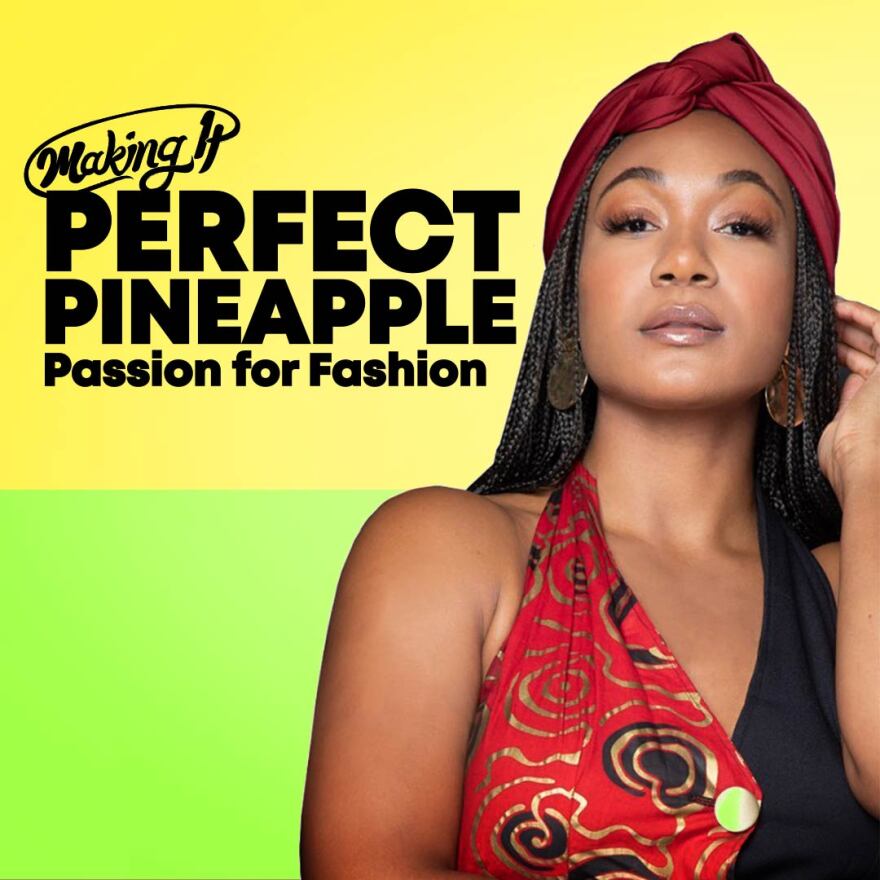Maker: Charron Leeper Martin
Business: Perfect Pineapple
Your relationship with your grandmother, Eunice, played an important role in the start of your business. What was she like?
She was the most elegant, courageous, and loving person I've ever met. She was always about excellence. I attribute to my grandmother the reason why I'm cultured. She always drove home the importance of knowing our African heritage. But she was also very creative, and she always encouraged and celebrated the creativity in me. She was just a great pillar of our family. Around 2009, she got her diagnosis of breast cancer. And so when she died [in 2017], it had, it definitely changed our family dynamic.
Leeper Martin's business, Perfect Pineapple, serves as a family legacy to her grandmother, Eunice Brown. [Charron Leeper Martin]
It wasn’t initially in your plans to start your own business, so what gave you the idea for your product?
I was going natural with my hair, so I would wrap my hair with this scarf, and I got a knot in it. And for years, I just left the knot in there and found different ways to tie it with the knot in there. Then, I put my hair up in the pineapple style and I was like, “that's kind of cute.” And that’s when the light bulb went off. Based on where the hair industry was going, natural was just becoming popular, and Black women specifically are really trying to be like, “I want to embrace my natural hair.” And so I knew that it was a thing, and I just went with it.
Perfect Pineapple's handmade wraps come in many different styles with endless possibilities for how to wear them. [Perfect Pineapple]
You found opportunities to test out your wraps before fully committing to starting your business. What did you discover?
I would wear my hair wrapped to work, which was also kind of me embracing being African-American and being Black in a corporate setting. I was working at a very corporate job, a very reputable company. I'm wearing heels and pants and blazers every day to work. So I kind of tested the product out by seeing if I could practically use it in that setting, because that's everybody's “every day.” So I'm like, if I can't use it every day, the chances of me buying it are slim for my customers. When I did that, and I started just kind of being bold, it was a bold statement to the few Black people that were there. And usually you feel as a Black woman, you feel less intimidating to your white colleagues, or more professional, or you're even treated as if you're more professional when your hair is straight. And so that was the culture. But me wearing my hair wrapped was a big statement. And so then those people used to ask me, “Where did you get your wrap from?” And that also kind of validated the demand, validated that this is a something that could go to market.
Leeper Martin tested out her wraps by making a bold statement at her previous corporate job. [Perfect Pineapple]
There’s definitely something to be said for there not being as many female-owned or minority-owned businesses. From your perspective, what has starting a business been like for you personally, as both a woman and a minority?
First of all, it's just hard being Black, let's just start there. It's beautiful being Black, I love being Black. I would never want to be anything else. But I just think that there's such a learning deficit and there’s such a cultural learning deficit. Like even in corporate America, there are social norms that I think are passed down because your grandfather owned a business, or your dad is a director, or there's just a culture of knowing what to do, business acumen, so to speak, that are no-brainers, that are second nature on top of access to resources or a personal network that just has a greater, greater median income to invest in you. And that is systemic. So it's always a different feeling as a minority to start a business because your literal generational circle and social circle have a different buying power and a different mentality towards their relationship with money. And you do, too. It's sometimes inherent. It's sometimes passed down. So even as an entrepreneur, you're that change agent for your generation, and it is extremely hard to be a trailblazer. But I will say it's been a joy starting a business as a Black woman, and as our culture and our climate with COVID and things have been highlighted or re-highlighted, there have been opportunities specifically for Black women, and I’m excited about that.
Black entrepreneurs face plenty of additional challenges while trying to start their business simply by being a minority, Leeper Martin explained. [Perfect Pineapple]










